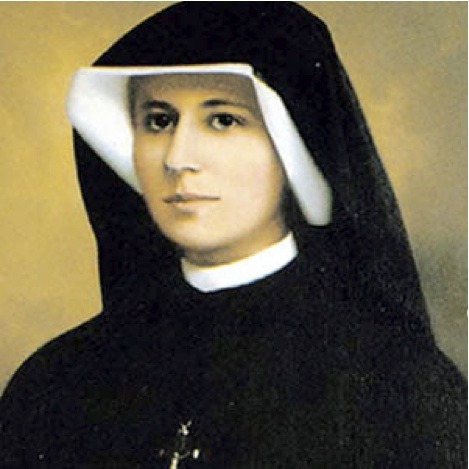
Sister Faustina was born on August 25, 1905 in Glogowiec, Poland of a poor and religious family of peasants, the third of 10 children. She was baptized with the name Helena in the parish church of Swinice Warckie. From a very tender age she stood out because of her love of prayer, work, obedience, and also her sensitivity to the poor. At the age of seven she had already felt the first stirrings of a religious vocation. Helen made her first Holy Communion at the age of nine, which was very profound moment in her awareness of the presence of the Divine Guest within her soul. She attended school for only three semesters. After finishing school, she wanted to enter the convent, but her parents would not give her permission. Being of age at 16, Helen left home and went to work as a housekeeper in Aleksandrów, Lodi, and Ostrówek in order to find the means of supporting herself and of helping her parents. Helen never lost her desire for a religious vocation. After being called during a vision of the Suffering Christ, she entered the Congregation of the Sisters of Our Lady of Mercy on August 1, 1925, and took the name Sr. Maria Faustina of the Most Blessed Sacrament. She lived in the Congregation for thirteen years in several religious houses. She spent time at Krakow, Plock and Vilnius, where she worked as a cook, gardener, and porter.
Externally nothing revealed her rich mystical interior life. She zealously performed her tasks and faithfully observed the rule of religious life. She was recollected and at the same time very natural, serene, and full of kindness and disinterested love for her neighbor. Although her life was apparently insignificant, monotonous and dull, she hid within herself an extraordinary union with God. It is the mystery of the Mercy of God which she contemplated in the word of God as well as in the everyday activities of her life that forms the basis of her spirituality. The process of contemplating and getting to know the mystery of God's mercy helped develop within Sr. Maria Faustina the attitude of child-like trust in God as well as mercy toward her neighbors.
Sister Faustina was a faithful daughter of the Church which she loved like a Mother and the Mystical Body of Jesus Christ. Conscious of her role in the Church, she cooperated with God's mercy in the task of saving lost souls. At the specific request of and following the example of the Lord Jesus, she made a sacrifice of her own life for this very goal. In her spiritual life she also distinguished herself with a love of the Eucharist and a deep devotion to the Mother of Mercy. The Lord Jesus chose Sr. Maria Faustina as the Apostle and "Secretary" of His Mercy, so that she could tell the world about His great message, which Sr. Faustina recorded in a diary she titled Divine Mercy in My Soul. In the Old Covenant He said to her: "I sent prophets wielding thunderbolts to My people. Today I am sending you with My mercy to the people of the whole world. I do not want to punish aching mankind, but I desire to heal it, pressing it to My Merciful Heart." (Diary, 1588). In an extraordinary way, Sr. Maria Faustina's work sheds light on the mystery of the Divine Mercy. It delights not only the simple and uneducated people, but also scholars who look upon it as an additional source of theological research. The Diary has been translated into more than 20 languages, including, English, German, Italian, Spanish, French, Portuguese, Arabic, Russian, Hungarian, Czech, Slovak, Polish, Castilian, Brazilian, Vietnamese, Korean, Chinese, Swedish, Ukrainian, Dutch and Japanese.
Sister Maria Faustina, consumed by tuberculosis and by innumerable sufferings which she accepted as a voluntary sacrifice for sinners, died in Krakow at the age of just 33 on October 5, 1938, with a reputation for spiritual maturity and a mystical union with God. The reputation of the holiness of her life grew as did the cult to the Divine Mercy and the graces she obtained from God through her intercession. In the years 1965-67, the Investigative Process into her life and heroic virtues was undertaken in Krakow and in the year 1968, the Beatification Process was initiated in Rome. The latter came to an end in December 1992. On April 18, 1993 our Holy Father, John Paul II raised St. Faustina to the glory of the altars. She was canonized on April 30, 2000.
Source: https://www.thedivinemercy.org/message/stfaustina/bio